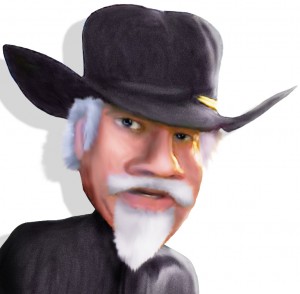August 3, 2021
Just Saying…
 By Q.C. Jones
By Q.C. Jones
A bad speller in two languages
Your pal QC and the Misses have been regular visitors to Mexico since the 1980s. Upon each of those visits, I have always had the dream of being able to speak the language. A couple of times, I even made at least a token effort to pick-up one of the travel phrase books to equip myself with a touch of the lingo. But the effort was half-hearted and lacked any kind of longer-range action.
I did take language in both high school and college. Not French, not German, nor Spanish were selected. I still remember talking to my high school guidance counselor. We discussed the “working” value of speaking one of the languages offered. Together we surmised there would never be a real opportunity to put a language to use because nobody in our small town ever traveled out of the country. Together, we came up with the seemingly wise decision to enroll in Latin.
A quick word on Latin. Latin is the root of both science and western civilization. Latin and Greek are the classical languages of the western world. According to scholars, Latin and Greek were at the core of curriculum in most elite colleges throughout Europe since the dawn of formal education. Until about 1970 when the practice started to wane, most thought no educated man did not understand these languages. Strangely, my counselor meeting took place in that very year. Apparently, she missed the memo.
Latin is a dead language. Meaning there are no native speakers of the language. This brings us to a little ditty learned just outside the classroom where I slaved over millennium old Roman Poetry. Ironically, I have forgotten most of eight semesters of Latin but I do remember this:
Latin is a dead language,
as dead as dead can be.
First it killed the Romans,
now it’s killing me.
Spanish, on the other hand, is still alive and kicking. In the words of the late great disc jockey of my misspent youth, Casey Kasem, Spanish has been holding in the Top-10 native speaker languages of the world, currently standing at Number Two right behind Mandarin Chinese.
If you are an English speaker and monolingual to boot, you can take solace in this fact. There are more English speakers in the world than any other language. Over 1,132 million people speak English. Mandarin Chinese comes in a close second with 1,117 million folks competent in the tongue. Spanish finishes in the fourth position with 534 million speakers. Your erstwhile correspondent is trying to give Spanish a one-man booster shot. But I digress.
Most of my “espanol” (in Spanish they use capital letters sparingly) was learned from either the Cisco Kid, Speedy Gonzales cartoons, Mexican restaurant menus, or obscure songs which included phrases in Spanish to drive home a point. Here are a few examples:
Both the Cisco Kid and his goofy partner Poncho wore a Sombrero which is Spanish for hat.
Cisco was fond of greeting the local sheriff as “Amigo” which means a male friend.
Speedy Gonzales had repeatedly said, “arriba, arriba” which translates to upward and upward or upward and onward while “andale, andale” translates to come on.
On a personal note, my favorite breakfast café in Puerto Vallarta is named Andale’s. I have learned much Spanish from reading their menu which is bi-lingual with Spanish and English listed side by side. Here are a few words compliments of the chef.
One of the daily specials was “chili con carne” which translates into chili with meat. Similarly, “huevos con chorizo” is eggs (huevos) with a spicy Mexican style sausage (chorizo).
A salad is “ensalada” and a fish is “pescado.” Meals often come with “pan” (bread).
Many of my favorite Texas songwriter friends feel compelled to add a touch of Spanish to songs. Some are quite instructional. Back in 2005, Gary P. Nunn wrote a quite instructional song about his favorite beer. Here are the lyrics:
Corona con lima, Corona with lime
Todo el tiempo, All of time
Sticking with to the beer theme, another Texas singer wrote a song with chorus containing these words repeated four times.
“Una mas cerveza por favor senorita” which translates to “one more beer please, miss.”
Armed with this limited vocabulary, I discovered I could survive but something was missing. So, after 40 years I finally took the plunge and started real lessons. My vocabulary has grown to 300 words which is about the same as a two-and-a-half-year-old toddler who likes beer. My goal is to reach 1,500 words which will put me about the same as my five-year-old grandson only with a taste for cerveza.
Along the way, I discovered I am just as bad at spelling in Spanish as English. Just saying and adios…..


